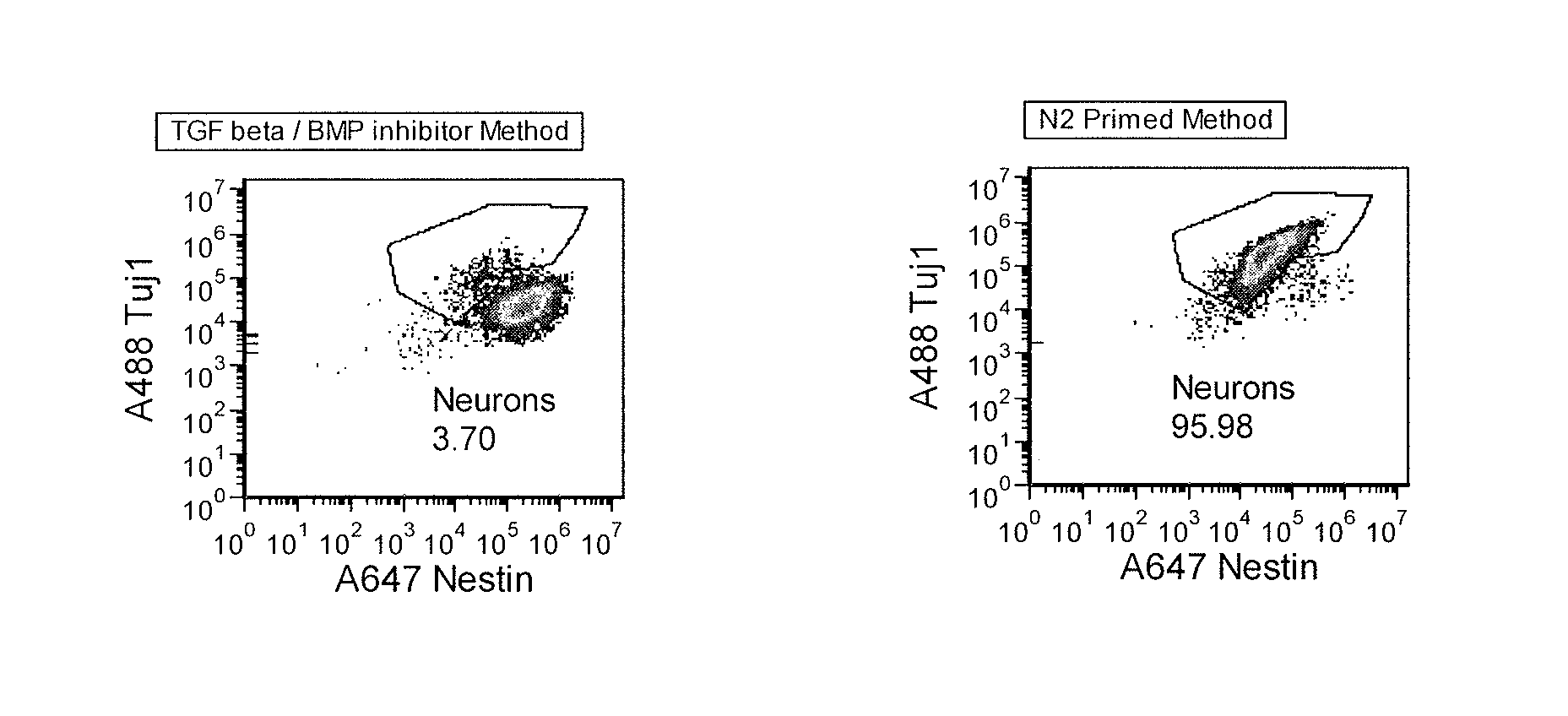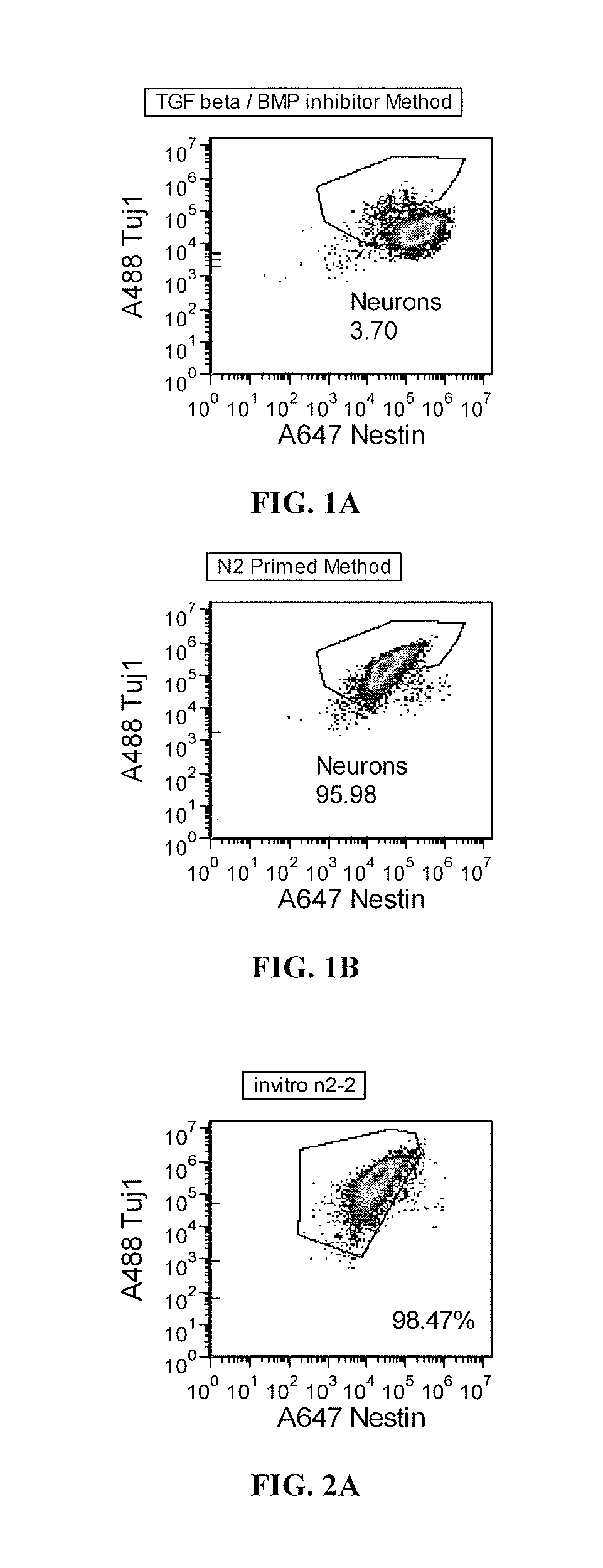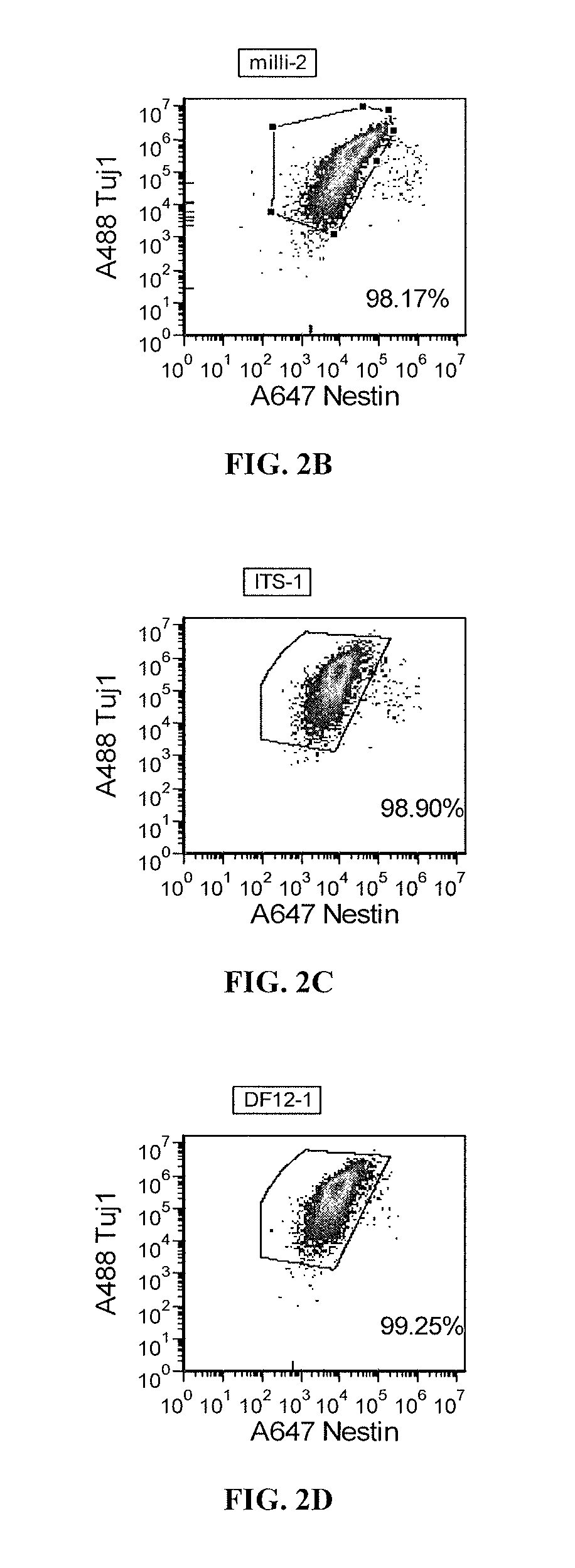Priming of pluripotent stem cells for neural differentiation
a stem cell and pluripotent state technology, applied in the field of stem cell development, can solve the problems of reducing the reproducibility of differentiation protocols, inhibiting the effectiveness of maintaining cells in a pluripotent state, etc., and achieve the effect of large-scale production and high efficiency
- Summary
- Abstract
- Description
- Claims
- Application Information
AI Technical Summary
Benefits of technology
Problems solved by technology
Method used
Image
Examples
example 1
Priming of iPS Cells Prior to Differentiation Leads to Greater Neural Induction
[0177]Differentiation of pluripotent cell cultures into functional neurons by suspension culture of cell aggregates or embryoid bodies (EB) is a highly variable process. Success of neural differentiation with current published methods that use TGFβ inhibitors (e.g., SB-431542; Dorsomorphin or Noggin, which are also BMP inhibitors) is dependent on the cell line and the pluripotent cell culture methods and media used, and can vary from passage to passage.
[0178]Here pluripotent cells were “primed” in a growth factor-free medium prior to aggregate / EB formation, which resulted in very efficient differentiation (>95% purity) to a neuronal lineage without the use of small molecule inhibitors of the TGF beta superfamily (such as the activin / Nodal / TGFβ / GDF branch and BMP branch). This priming method is in contrast to a method based on published literature using two inhibitors of the TGF beta signaling pathway (a B...
example 2
Neural Induction by Priming with DMEM-F12 and N2 Supplement is Due to bFGF and TGF beta Withdrawal
[0179]Pluripotent cells are usually maintained in mTeSR culture medium, which contains bFGF and TGF beta as the main growth factors for the maintenance of pluripotency. TeSR is comprised of DMEM-F12 as a basal medium, and also contains, in addition to bFGF and TGF beta, Insulin, holo-Transferrin, and Selenium. N2 supplement contains Insulin, holo-Transferrin, Selenium, Progesterone, and Putrescine. The concentrations of the individual components in N2 supplements may vary by supplier. Gradually transitioning pluripotent cells into DMEM-F12 with 1× N2 supplement medium reduces bFGF and TGF beta growth factor availability over time, with little change in other components. The only components present in the DMEM-F12 with 1× N2 supplement medium that are not available in mTeSR at significant levels are Progesterone and Putrescine. To investigate whether a specific component present in the N...
example 3
Neuron Production Procedure
[0180]iPS cells were maintained on Matrigel in TeSR medium (Stem Cell Technologies) and sodium citrate split one passage prior to aggregate formation and grown in T150 flasks, but can be scaled for starting cells in other culture formats. Alternate pluripotent cell culture media (such as E8 media: Chen et al., 2011), containing varying concentrations of TGFβ and / or bFGF, can be used to optimize neural differentiation of different iPS cell lines or clones. Pluripotent cell cultures were then “primed” for differentiation three or four days prior to aggregate formation. Priming of the cells involves gradually transitioning the cells to DMEM-F12 supplemented with 1× N2, which does not contain TGFβ and bFGF. An example of a priming protocol includes culturing the sodium citrate split cells from above for Days −4 and −5 (referenced to the start of aggregate formation) in 80% 1× TeSR / 20% TeSR1 5× supplement plus 10 μM blebbistatin, removing the spent media on Day...
PUM
| Property | Measurement | Unit |
|---|---|---|
| time period | aaaaa | aaaaa |
| time period | aaaaa | aaaaa |
| diameter | aaaaa | aaaaa |
Abstract
Description
Claims
Application Information
 Login to View More
Login to View More - R&D
- Intellectual Property
- Life Sciences
- Materials
- Tech Scout
- Unparalleled Data Quality
- Higher Quality Content
- 60% Fewer Hallucinations
Browse by: Latest US Patents, China's latest patents, Technical Efficacy Thesaurus, Application Domain, Technology Topic, Popular Technical Reports.
© 2025 PatSnap. All rights reserved.Legal|Privacy policy|Modern Slavery Act Transparency Statement|Sitemap|About US| Contact US: help@patsnap.com



